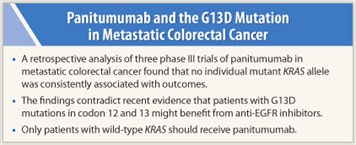The need to restrict treatment with panitumumab (Vectibix) to metastatic colorectal cancer patients with wild-type (normal) KRAS tumors was upheld in a study presented at the 2011 European Multidisciplinary Cancer Congress (EMCC). The investigation found a consistent lack of benefit for the drug across the most common KRAS mutant alleles.1

 “We can say that patients with metastatic colorectal cancer harboring any of the most common codon 12 and 13 mutant KRAS alleles are unlikely to benefit from panitumumab treatment,” said Marc Peeters, MD, PhD, of Antwerp University Hospital, Edegem, Belgium. “Only patients with wild-type KRAS should be treated with EGFR inhibitors.”
“We can say that patients with metastatic colorectal cancer harboring any of the most common codon 12 and 13 mutant KRAS alleles are unlikely to benefit from panitumumab treatment,” said Marc Peeters, MD, PhD, of Antwerp University Hospital, Edegem, Belgium. “Only patients with wild-type KRAS should be treated with EGFR inhibitors.”
Interestingly, the current analysis of data by KRAS mutant allele status contradicts recent findings regarding KRAS mutations in cetuximab (Erbitux) trials. De Roock and colleagues showed that patients with KRAS G13D mutations did indeed have longer overall and progression-free survival with cetuximab treatment, compared with patients harboring other KRAS mutations.2 And at the 2011 ASCO Annual Meeting, Tejpar and colleagues found the G13D mutation to be associated both with poor prognosis in treatment-naive patients and with benefit from first-line cetuximab,3 essentially reversing the poor prognosis observed with chemotherapy alone, pointed out Pierre Laurent-Puig, MD, PhD, of the Université Paris Descartes in France, who discussed Dr. Peeters’ findings at the EMCC meeting.
Three Phase III Trials of Panitumumab
 Dr. Peeters presented the retrospective analysis of patients treated in phase III studies of panitumumab plus first-line FOLFOX4 (leucovorin, fluorouracil [5-FU], oxaliplatin), second-line FOLFIRI (leucovorin, 5-FU, irinotecan), or best supportive care (monotherapy). Patients were screened for the seven most common KRAS mutations in codons 12 and 13 (KRAS G12A, G12C, G12D, G12R, G12S, G12V, G13D).
Dr. Peeters presented the retrospective analysis of patients treated in phase III studies of panitumumab plus first-line FOLFOX4 (leucovorin, fluorouracil [5-FU], oxaliplatin), second-line FOLFIRI (leucovorin, 5-FU, irinotecan), or best supportive care (monotherapy). Patients were screened for the seven most common KRAS mutations in codons 12 and 13 (KRAS G12A, G12C, G12D, G12R, G12S, G12V, G13D).
“Collectively, mutant KRAS codon 12 and 13 alleles are established biomarkers for lack of response to anti-EGFR antibodies in metastatic colorectal cancer. We evaluated the prognostic and predictive impact of individual codon 12 and 13 KRAS mutations in three phase III studies,” Dr. Peeters said.
Mutated KRAS codon 12 and 13 alleles were detected in 40% to 45% of tumors, and their distribution was conserved across studies and equally balanced among treatment arms.
KRAS Mutant Alleles and Outcomes
In the control arm—in which a prognostic effect might be demonstrated—no individual mutant allele was consistently associated with progression-free or overall survival outcomes.
“What is more important is the predictive effect,” he said, “and there was no individual mutant KRAS allele consistently associated with progression-free or overall survival outcome in all three studies,” Dr. Peeters said.
Only in study 20050203 (panitumumab plus FOLFOX) were two individual mutant alleles significantly associated with outcomes: G12V was favorably associated with overall survival (P = .0369) and G13D was unfavorably associated with overall survival (P = .0018) in the panitumumab arm. In the pooled analysis, G12A was the only mutant allele significantly associated with a negative panitumumab treatment effect on overall survival. ■
Disclosure: Dr. Peeters has disclosed a relationship with Amgen. Dr. Laurent-Puig has received honoraria from Merck Serono and Amgen.
Expert Point of View: Panitumumab Is Not Beneficial in KRAS Mutations: No Exceptions
References
1. Peeters M, Douillard JY, Van Cutsem E, et al: Evaluation of individual codon 12 and 13 mutant (MT) KRAS alleles as prognostic and predictive biomarkers of response to panitumumab (pmab) in patients with metastatic colorectal cancer (mCRC). 2011 European Multidisciplinary Cancer Congress. Abstract 33LBA. Presented September 25, 2011.
2. De Roock W, Jonker DJ, Di Nicolantonio F, et al: Association of KRAS p.G13D mutation with outcome in patients with chemotherapy-refractory metastatic colorectal cancer treated with cetuximab. JAMA 27:1812-1820, 2010.
3. Tejpar S, Bokemeyer C, Celik I, et al: Influence of KRAS G13D mutations on outcome in patients with metastatic colorectal cancer treated with first-line chemotherapy with or without cetuximab. 2011 ASCO Annual Meeting. Abstract 3511. Presented June 4, 2011.

 Axel Grothey, MD, of the Mayo Clinic, Rochester, Minnesota, found the findings presented by Marc Peeters, MD, PhD,1 at the 2011 European Multidisciplinary Cancer Congress to be of great interest, from both clinical and research perspectives.
Axel Grothey, MD, of the Mayo Clinic, Rochester, Minnesota, found the findings presented by Marc Peeters, MD, PhD,1 at the 2011 European Multidisciplinary Cancer Congress to be of great interest, from both clinical and research perspectives.